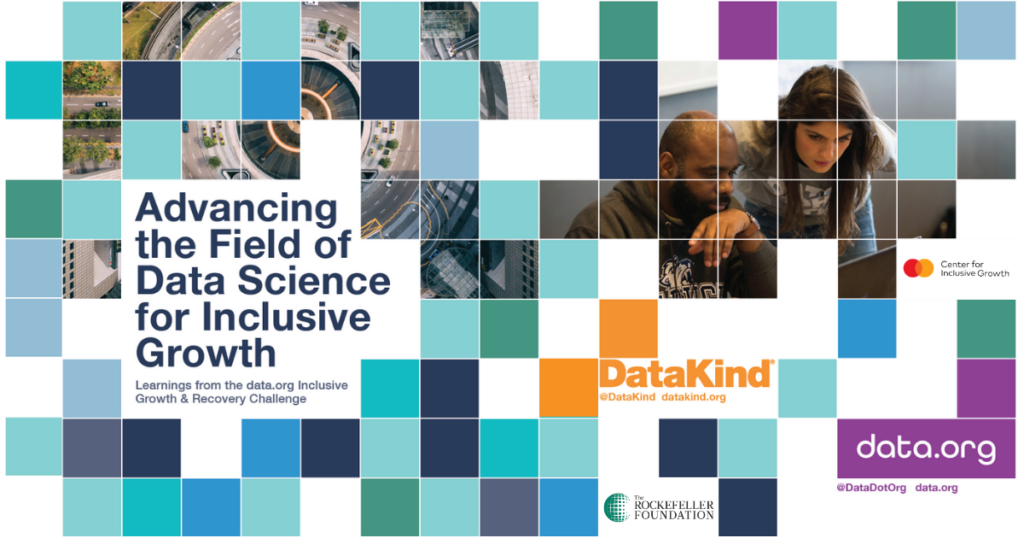By Jackson Thomas, Project Manager, DataKind
In early 2020, as part of its commitment to building the field of Data Science for Social Impact, data.org launched the $10 million Inclusive Growth and Recovery Challenge in partnership with the Mastercard Center for Inclusive Growth and The Rockefeller Foundation. DataKind served as the Technical Partner for the Challenge.
More than 1,260 individuals and organizations from four continents submitted applications for the Challenge across the themes of Cities and Towns, Access to Capital, Jobs of Tomorrow, or an open theme track. Following a complex review process led by hundreds of DataKind volunteers from around the world, the Challenge identified eight exemplary awardees for funding and ongoing technical assistance over the next two years.
We’re excited to share the Challenge report that highlights the opportunities and gaps the Challenge uncovered as well as the ideas and focus areas of the applicants. We hope the report will provide helpful insight into the Challenge process and inspire additional work into some of the areas of opportunity.
DataKind as the technical partner
We provided instructional webinars for potential applicants, spearheaded the recruitment and training of hundreds of expert volunteer judges, and provided guidance on the quality of data science incorporated in each project. We’re also supporting several Challenge winners and other applicants on project execution through our DataCorps® program and DataDive® events.
In partnership with data.org, we designed and conducted a thoughtful and rigorous evaluation of each application.
First, we reached out to our global community, including data.org’s ecosystem of data science organizations, to recruit and train a team of nearly 400 judges. We trained and supported this team of data science experts to assess Challenge applications and identify the most promising ideas. Our volunteers completed 3,500+ reviews in just four weeks. The team represented different backgrounds, experiences, and nationalities, hailing from 49 countries across 19 time zones.
Applications that passed this first round of review were then invited to submit more detailed proposals that were evaluated by senior staff at data.org, DataKind, the Mastercard Center for Inclusive Growth, and The Rockefeller Foundation. Each of these applicants also completed a 90-minute interview, including a project presentation and data readiness review.
Key learnings from the Challenge
Critical topics for further inquiry
After considering trends from our expansive review of applications, DataKind and data.org identified six prevalent topics that are critical to inclusive growth and recovery and that have tremendously exciting applications of data science. The topics also focus on unique stakeholders and environments, including individuals, groups, and communities that too often don’t receive an equal share of the benefits of economic growth. These topics will be essential for funders, organizations, and researchers to consider within the inclusive growth space.
Each topic included applications from teams across the world that incorporate diverse data science techniques to solve an array of pressing problems. These topics include:
- Smallholder farmers and agriculture
- Micro, small, and medium-sized enterprises (MSMEs) and entrepreneurship
- Affordable housing and neighborhoods
- Gender equality
- Urbanization and sustainable development
- Youth unemployment
Trends
Major trends across applicant diversity, type, and data science solutions are detailed in the report. A few highlights include:
- 68% of projects addressed the United Nations Sustainable Development Goal #1: No Poverty.
- The majority of application topics (>40%) were aligned with the Challenge area Leave no place behind – Cities and Towns.
- The majority of applicants proposed to tackle issues related to economic development (>36%). These topics included areas such as microcredit lending, support for small businesses, agriculture, among others.
- 28% of projects were proposed to be implemented in Sub-Saharan Africa.
- The most common data science techniques proposed by applicants are listed below. We provide definitions and details for each of these techniques in the report.
- Machine Learning
- Natural Language Processing
- Geospatial Analysis
- Computer Vision
- Predictive Modeling and Forecasting
- Visual Analytics
- Data Engineering and Data Preparation
Join the conversation
Register for the upcoming webinar on Thursday, April 29, 2021 at 12 PM ET as we discuss what we learned about the problems applicants were tackling (and their alignment with the United Nations Sustainable Development Goals), the types of data science applied to these problems, as well as overall takeaways from implementing a Challenge of this scale. Speakers include:
- Afua Bruce, Chief Program Officer, DataKind
- Thijs Defraeye, Group Leader, SymBioSys, Empa
- Thomas Motmans, Sustainable Energy Finance Specialist, Basel Energy for Sustainable Energy (BASE)
- Ginger Zielinskie, Chief Strategy Officer, data.org
Whether you’re planning a Challenge or applying for one, join us to hear what we’ve learned, and add your voice to the conversation. Please submit your questions now at info@data.org or during the event.
Finally, we want to thank the 1,260+ Challenge applicants, 400+ DataKind volunteers, and our panel of Expert Judges. We also want to thank data.org, the Mastercard Center for Inclusive Growth, and The Rockefeller Foundation for their support, expertise, and leadership.
Jackson Thomas managed the key activities and relationships in DataKind’s implementation of the data.org Inclusive Growth & Recovery Challenge, including volunteer judge selection and management.
Quick Links
- Meet the awardees of the data.org Inclusive Growth and Recovery Challenge
- How Can Data Science Drive Equitable Growth and Recovery? Our $10M Challenge Offers Some Insights into the Future.
- DataKind Partners with data.org on $10M Inclusive Growth & Recovery Challenge
- DataKind Teams Up With Google to Apply AI to Social Good
- Advancing the Capacity of the Civic Ecosystem to Apply AI to Cities: DataKind & Microsoft Share Learnings from AI Accelerator
- Interested in sponsoring a Challenge or event? Partner with us.
- Interested in supporting our work? Donate here.
- Have you signed up to volunteer with DataKind yet? Look no further.







